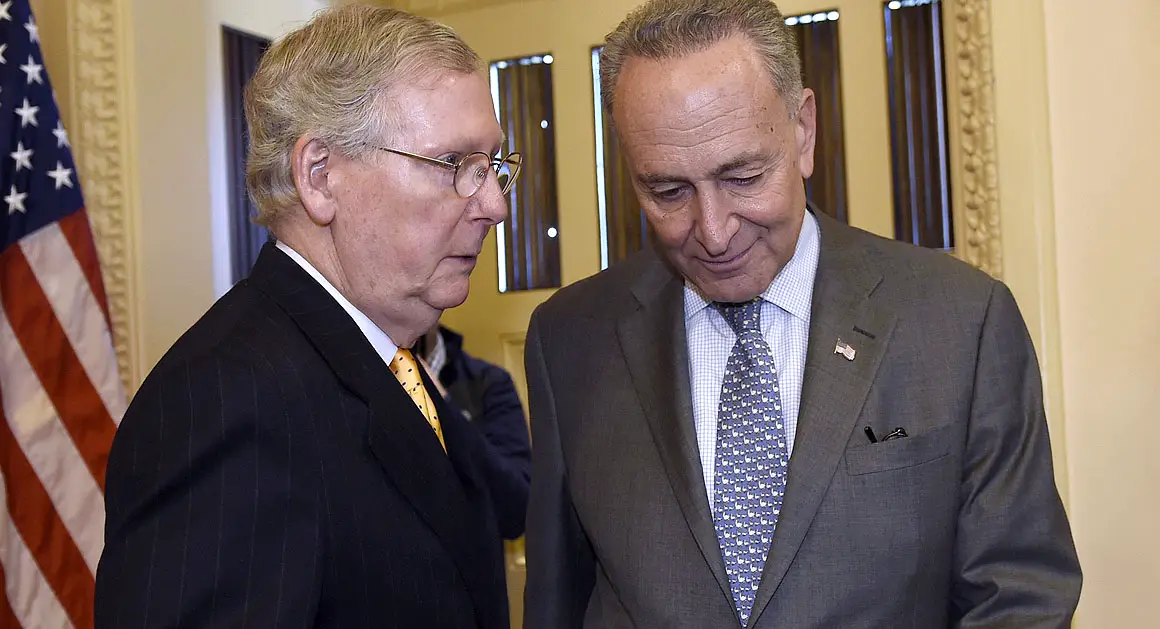Republicans have barely moved on the topic of healthcare since Donald Trump promised to repeal ObamaCare on day one of his presidency. Yes, the House has passed a repeal bill which largely rolls back the Affordable Care Act in stages, but the issue is stalled in the Senate with no real path to fruition as factions of the GOP splinter and bicker over details.
At this point, Senate Majority Leader Mitch McConnell has basically threatened the conservative wing in his party to soften their stance, or he may begin negotiating with Democrats over how to repair and strengthen ObamaCare, rather than repeal it. This according to The Hill:
Senate Republicans are starting to consider what they should do if their ObamaCare replacement bill fails to pass.
Lawmakers are largely splitting into two camps: those who want to work with Democrats on a fix to the healthcare law, and those who want to simply pass a straight repeal of the law and work on a replacement later.
While conservatives are mainly behind the second option, Senate Majority Leader Mitch McConnell (R-Ky.) made waves on Thursday by saying that his party could work with Democrats to stabilize ObamaCare markets if the repeal bill fails.
“If my side is unable to agree on an adequate replacement, then some kind of action with regard to private health insurance markets must occur,” McConnell said.
McConnell’s comments could have been intended as a message to conservatives who are opposed to the existing repeal bill, suggesting they will like the result even less if the GOP has to work with Democrats.
Indeed, McConnell warned late last month that “my suspicion is that any negotiation with the Democrats would include none of the reforms that we would like to make.”
With each passing day, it’s looking more and more like Senate Republicans will be unable to unify around a reconciliation repeal bill with any teeth on it. McConnell must see it more likely, and perhaps more politically suitable, to carve a path with moderates and willing Democrats than trying to placate conservative Republicans in the Senate.
More from The Hill story:
Some Republican senators have even expressed eagerness to work with Democrats on a healthcare bill.
In announcing her opposition to the ObamaCare repeal-and-replace bill last month, centrist Sen. Susan Collins (R-Maine) pointed to the millions of people who would lose coverage under the Republican bill and wrote on Twitter: “I want to work w/ my GOP & Dem colleagues to fix the flaws in [the Affordable Care Act].”
Sen. Ron Johnson (R-Wis.) has also been pushing for a bipartisan fix. “Let’s stabilize the markets, then work long term on a bipartisan solution to actually fix the healthcare system,” he said last month.
Sen. John McCain (R-Ariz.) said on CBS on Sunday that the GOP bill is “probably going to be dead.”
He then suggested that Democrats be at least somewhat involved in the new process if the current measure fails.
“It means they can have amendments considered,” he said. “And even when they lose, then they’re part of the process. That’s what democracy is supposed to be all about.”
The battle lines are clearly drawn within the party, with the usual suspects lining up on both sides of the issue. Conservative stalwarts like Ted Cruz and Rand Paul would rather pass a clean repeal bill, and work out the details later:
But several conservative senators are taking the opposite tack. If the current bill fails, they say, Republicans should just repeal the healthcare law without a replacement, then work on an alternative later.
Conservative Sens. Ted Cruz (R-Texas), Mike Lee (R-Utah), Rand Paul (R-Ky.) and Ben Sasse (R-Neb.) have all expressed support for that strategy.
President Trump has also endorsed the idea of repealing first and replacing later.
“If Republican Senators are unable to pass what they are working on now, they should immediately REPEAL, and then REPLACE at a later date!” Trump tweeted last week.
The problem is that a straight repeal bill almost certainly would not have the votes to pass, given that many other Republicans want to put forward an alternative way for people to get coverage at the same time.
That dynamic is immensely frustrating for conservatives, who note that moderate Republicans already voted for straight repeal of ObamaCare in 2015, when they had the safety of knowing it would never become law because then-President Barack Obama would veto it.
It is peculiar that having already passed a clean repeal bill in 2015, Republicans are unwilling to do it again. Of course, in 2015, President Obama would never sign such a bill and it would die at the veto pen. This time, a repeal bill would have real consequences both the political and practical sense.
Just wait for the next few months and look for the Trump tweet when he says that it would be too harsh to let ObamaCare collapse on it’s own, so they have to negotiate with Democrats and work on fixing it. At that point, the concept of “repeal” will be toast, at least until 2018.
Donate Now to Support Election Central
- Help defend independent journalism
- Directly support this website and our efforts
